Reginald Theodore Knight is one of the fast disappearing legion of the racing fraternity’s ‘old guard’. He trained from small premises on Milnerton racecourse and with a string of only 20 horses produced the likes of 1970 July winner Court Day and 1977 Queen’s Plate winner Bold Monarch among others. Reggie recently celebrated his 85th birthday and we caught up with him to chat about his fascinating life with horses.
Reggie furnished precise, clear directions which led easily to the front door of his Plattekloof Glen home, which he shares with his wife Mildred and their son Trevor. The exterior of the house is an indicator of its occupant – neat, tidy and with everything in its place.
They say age is just a number and as numbers go, eighty-five is quite a biggie. However, the advancing calendar is merely one more thing Reggie seems to have under control. Time has been kind to him and despite the snow white hair, neatly combed, his smooth, unlined face doesn’t look a day over 60. He is elegantly attired in cream slacks and a pressed blue shirt with a maroon v-neck the only concession that he might be a little more vulnerable to the cold than he used to be. He moves energetically with the sort of strong, upright posture that went out of fashion with the military and he later confirms that he spent a year and a half in the Physical Training Battalion as a youth.
About Reggie
His story starts in Cape Town on 7 October 1935. An only child, Reggie’s young mother passed away when he was 3. His father, a miller with Daniel Mill & Sons, was unable to take care of the young boy and Reggie was raised by his grandmother and aunt in Johannesburg. “When I was about 8, my father married a lovely lady from Prieska, who decided she wanted me back. I don’t think my own mother could have been better.” The family moved to the suburb of Brooklyn and that, reminisces Reggie “is when the horse thing started.”
It was the era of private training premises and apprentice jockeys were still trained under the old system, sharing a house with the trainer they were indentured to. Milnerton and surrounds were the epicentre of racing. “I was interested in racing, but was a little on the big side. I could probably have been a jockey if I put my mind to it, but my father tried to keep me away. He knew the hardships and consequences. In those days apprentices worked like grooms. You rode out with the jockeys in the morning, came back, rubbed down the horses and mucked out, did the morning feed, had breakfast and then took out the second string. Afterwards there was stable work, painting, mending tack, etc and in the afternoon you took the horses out for their afternoon walk.”
An owner/trainer by the name of Alfie Abrahams had a small yard across the road from the Knight household and Reggie befriended a coloured groom by the name of Kiepie. Kiepie would collect Reggie with a tap on his window at 4:30am and take him out with the racing string, sneaking him back to the house just before his parents came to wake him up for school.
Reggie’s father passed away when he was 12. Having not left much provision for his family, things were tight. “My mother got a waitressing job at the Waldorf, working the late shift from 2pm – 11pm. I’d get home from school, she would leave for work and I would see to my brother during the day. When she was due home, I’d wrap my little brother up in a blanket on my back and meet her at the bus stop to walk her home.”
In order to relieve the burden on his mother as well as to further his education, Reggie joined the Physical Training Battalion. “I didn’t enjoy it much. I became a Roman Catholic just to get out on a Sunday, because there was no Catholic church on site and the Catholics were taken to church in Town every Sunday. After a year and a half I’d had enough and was longing to get back to the horses.”
Life in racing
Once back in Cape Town, Reggie got a job with trainer AB Kruyer. “I was paid 10 shillings a week. I’d give 7 to my mother and keep 3. There were three of us in the yard – myself, Philip Kruyer (Patrick’s father) and apprentice jockey Harry Feldman. We’d club together and lived on penny butter, penny bread and penny polony (which was much better than the stuff you get these days), or sometimes pilchards in tomato sauce.”
Kruyer originally shared premises with Alec Shinas in Rugby, but with the help of Thys Greeff, a steward at Durbanville, he purchased some land in Milnerton. “The first portion of land was unsold, the next went to Stanley Gorton, then there was the sand track and AB Kruyer had the third property. Then came Cookie Amos and Captain General George Fisher, who always insisted on being called by his full title. Greeff threw the foundation, which we had to help dig and lay, then he sent one builder and one plasterer who taught us the basics and we had to do the rest. We built pretty good stables, I think. You did everything yourself back then. I think there were two vets in the whole of Cape Town and one rode a bicycle!”
Cape Hunt
Reggie was also a successful Cape Hunt rider, competing against the likes of Terrance Millard, Bobby Schutt and Arthur Gray. He rode for Billy Prestage’s father and a Mrs Steyn who trained for bookmakers Frank and Quinton Mulvey under the lap. “The horses ran under Mrs Steyn’s name and every time I won she gave me £100. You weren’t supposed to get paid in those days, but they couldn’t stop anyone giving us presents. That’s how I managed to make money and support my mother.”
Reggie eventually left Kruyer in search of better prospects and went to work for Sydney Laird. However, when Russell Laird joined the yard a few years later, Reggie knew there was not enough room for two assistants and decided to strike out on his own. “In those days it was very strict and the Jockey Club wanted a letter from the bank manager. Luckily I’d been pretty level headed and had a meagre bank account. The bank wrote me a very nice letter and a week later my license came through.”
Starting out
He gives a low whistle for emphasis and says “It was a struggle. I leased two horses from Stan Elley’s brother – Shamrock and Beylic – and got horses here and there. Considering that I never had more than 20 in my string, I had some good ones.” The ‘good ones’ included Bold Monarch (left in his care by Herman Brown for the 1977 Queen’s Plate), Mickey Livanos’ Court Day (Rothmans July), sprinters Top Sail and Hearing and he also claims Gatecrasher’s 1976 Met win as Herman Brown was at the sales in New Zealand and left the horse in Reggie’s charge. “I had the honour and pleasure of winning the last Republic Day Handicap with a filly called Adrift for Donald Wright and I bought a horse from Highlands called Main Brace for Ward Smith and won the Ward Smith Handicap that he sponsored.”
Association with Beck
Reggie inherited two Beck horses from the late Michael Roberts. “I corresponded with Mr Beck about the horses and I got them to win two races each, sent them back and that was that. Of course, he wasn’t the Mr Beck back then that he was when he finished up.”
A few years later, Beck purchased Noreen Stud and approached Reggie at the National Sales to run it for him. “I said that I knew a little about horses, but nothing about farming, but that I was willing to learn. Mr Beck was a character. He used colourful language, but he did it in such a way that you never took offense. He said, ‘Reggie, one f-up and you’re out! But if you do a good job, you won’t regret it. You will be well looked after.’ And I must say that he did.”
Noreen Stud
“I sold my business to Geoff Winshaw – he bought all my equipment and we arranged for him to take over the stables as well. It was hard to give up good horses, but Noreen Stud was my future. A lot of clients were unhappy – some moved to other yards, but some decided to give up racing. That’s how it worked back then – clients only moved if you gave up training or when they died.”
“I joined in January and learned as much as I could from the Gortons. They left at the end of July and I had to face my first foaling season on my own. Luckily I had a very good night watchman who helped a lot. The first time I foaled down a mare, the foal had just poked his front legs through and I felt so faint I had to go outside and get some air. Fortunately it all went smoothly and everything went well from there.”
“Mr Beck told me to run it as if it was my own farm and I worked day and night to do just that. It demanded a lot of sacrifice, but I made Mr Beck a promise to do my best and that was my best. I went to all the local farms asking for advice on grazing, ground irrigation, etc. I wasn’t too proud to ask questions and I learned and I worked hard. We stood two very popular stallions – Harry Hotspur and Roland Gardens and I made sure I was there for every covering. I had a policy of crisscrossing the farm on foot – it was a good way to check for white thorns, mole holes, check the grazing and move pipes at the same time. That’s why I’m still in such good shape! I made Mr Beck walk it too. I’d fetch him from his plane, and after lunch – usually ‘tamatiebredie’ which was his favourite – I’d take him round. ‘You’ll f-ing kill me!’ he’d always say.”
Mr Beck was an incredibly generous man. Because he’d bought the farm lock, stock and barrel, he gave the proceeds of that first crop back to the Gortons. When the first crop I took to the sales did well, he was so happy he sent me and my wife on a round the world trip. Mr Beck was the next best man to God and you can quote me. I was too scared to ask him for anything because he would never say no. He was the greatest loss to racing that I’ve ever known.”
Life after Beck
Reggie had to stand down from his duties at the obligatory retirement age of 65, but stayed on on a consultancy basis for many years. As part of his promise that he would be ‘well looked after’, his retirement package entitles Reggie to keep two mares at Highlands for the rest of his life. He has been a successful breeder in his own right, owning Broodmare of the year Pretty Falcon and producing the wonderful filly Northern Princess as well as Diana’s Choice, who earned him an extra R500k bonus as part of an incentive bonus for having passed through the ring at the Grand West Yearling Sale in 2006.
Reggie still drives and proudly says that he still washes his car himself (although admits that it takes him a little longer than it used to). Other than that, he devotes his time to his garden, his beautiful wife Mildred and his family. He has two daughters, Gina and Dalene and son Trevor as well as three granddaughters, Chantal (who has recently married jockey Ian Sturgeon), Natasha, and Shannon and one great granddaughter, Taylor-Jade.
Have Your Say - *Please Use Your Name & Surname*
Comments Policy
The Sporting Post encourages readers to comment in the
spirit of enlightening the topic being discussed, to add opinions or correct
errors. All posts are accepted on the condition that the Sporting Post can at
any time alter, correct or remove comments, either partially or entirely.
All posters are required to post under their actual name and surname - no anonymous posts or use of pseudonyms will be accepted. You can adjust your display name on your account page or to send corrections privately to the Editor. The Sporting Post will not publish comments submitted anonymously or under pseudonyms.
Please note that the views that are published are not necessarily those of the Sporting Post.
3 comments on “Reggie Knight”
Leave a Reply
‹ Previous
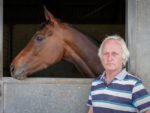


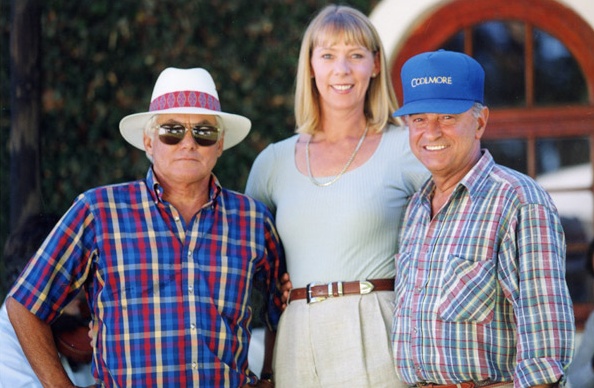
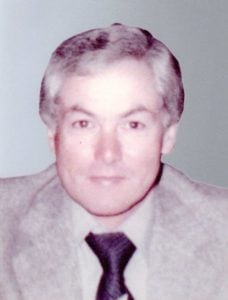
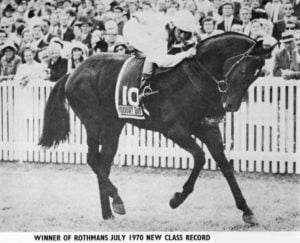
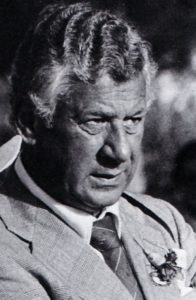
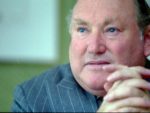
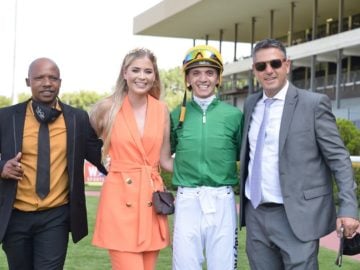
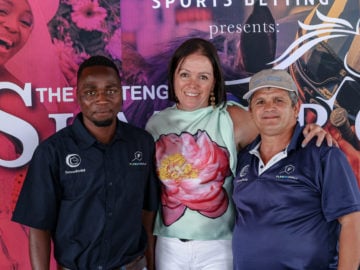
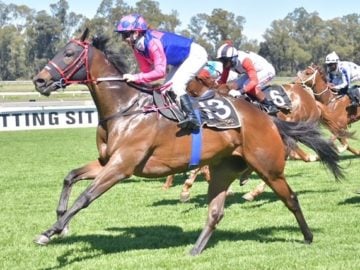
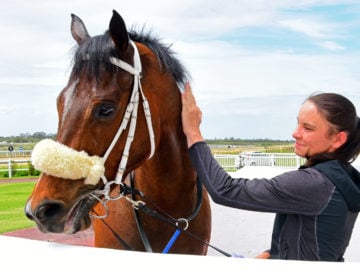
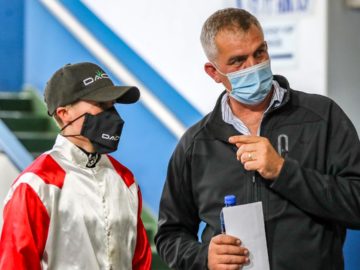






Wonderful story.
A picture of Gina with Ben Anderson, Jingles Perreira and Garry France got me interested.
Glad I looked him up.
Very interesting article, Roland Gardens, theres a name i haven’t thought about in years, had some crackerjack progeny (Pas De Quoi, Enchanted Garden, Roland’s Song, what an era of racing).
How times have changed, got to admire the older brigade
Hello Mr Knight and Gina, a very interesting read. I do recall meeting with yourselves as a young boy. Trust you are both still well considering this article is from six years ago.